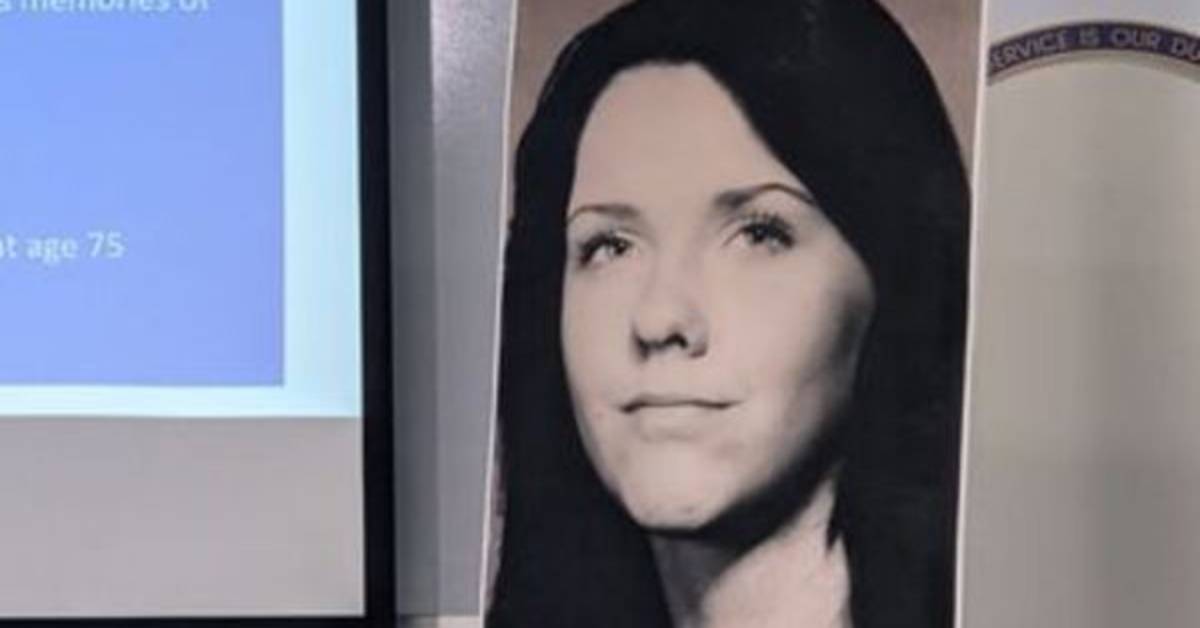
Carol Sue Klaber (Screenshot from news conference by WKRC)
Detectives in northern Kentucky say they’ve solved the 1976 rape and murder of a teenage girl using DNA technology.
But, the investigation into the suspect is far from a conclusion.
Carol Sue Klaber was last seen leaving her parents’ home on June 4, 1976, after dropping off her bike and getting into a car described as a Chevrolet Monte Carlo or a Pontiac Grand Prix driven by a man with sandy blonde hair.
A dentist found Carol Sue’s body in a ditch the next day. She’d been sexually assaulted and beaten to death with a tire iron. But her assailant left behind his DNA, which wouldn’t be analyzed for decades.
For years, Carol Sue’s murder went unsolved.
In 2017, the Boone County Sheriff’s Office cold-case detectives, Coy Cox and Tim Adams gave the case a second look. They met with the original detective on the case, Jerry Keith, who had long since retired but had carried the case with him for decades.
Cox and Adams investigated two suspects that Keith identified. The first was a man who’d stolen a vehicle matching the description in northern Indiana.
“He cooperated fully. And he was pretty candid about saying, ‘I’ve done a lot of things. I’m not going to deny that. But I did not kill Carol Sue Klaber,”” Cox recalled the man telling him.
Cox said he and Adams later called the man and told him he had been eliminated as a suspect, a promise they had made to him when they collected his DNA.
Next, Cox and Adams moved on to a second suspect, a man who committed rape in a nearby community in October 1978.
The Law&Crime Network’s Angenette Levy first reported on Cox looking into that perpetrator, Michael Dean Tate, in 2020. Cox and Adams identified Tate as the suspect in the rape case using a fingerprint on the victim’s car.
That victim was able to talk Tate into letting her go. Tate lived in Georgia and traveled to the area for work frequently in the 1970s and 1980s. Tate confessed to the rape but denied murdering Carol Sue.
When the DNA on Klaber’s body did not match Tate, Cox and Adams were back to square one.
Last fall, Cox and Adams contacted Othram Labs, a genetic genealogy company that assists law enforcement with investigations. They sent the evidence to the lab and obtained funding for the testing from Season of Justice.
“In less than two months from that time, we got a response from Othram Labs that, ‘Hey, we believe this is your guy,” Cox recalled.
Cox and Adams were given a name: Thomas Dunaway. But Dunaway died in 1990, so they had more work to do. They had to collect a DNA sample from a living family member for comparison- which they did.
“When we collected that, they said this is a 100% match. Wow. Parent-child match,” Cox said.
Cox and Adams discovered Dunaway had murdered a man in December 1976, six months after the murder of Carol Sue Klaber. While going through the case file on that murder, they discovered Dunaway committed the murder when he was AWOL from the U.S. Army.
They did more digging and found that Dunaway joined the Army more than a week after Carol Sue’s murder. They found that he had a vehicle that matched the description related to her disappearance and lived near Devou Park, where Carol Sue had been seen talking with a man who matched Dunaway’s description in the days before she died.
“Monday, June 7th, the Kentucky Post newspaper article comes out, and it describes the vehicle and the individual’s description in the newspaper,” Cox said. “So June the 14th, he’s putting pen to paper, enlisting in the Army.”
Cox said Dunaway went on a crime spree in 1976 that included Carol Sue Klaber’s murder, the murder of Ronnie Townsend in December 1976 and the burning of a car. Dunaway served time in prison for Townsend’s murder but was released in 1984.
This week, Cox said he obtained a court order to exhume Dunaway’s body to get a DNA sample from him so it can be entered into CODIS, the Combined DNA Index System, to see if he is linked to any other crimes. Cox said the law requires the DNA to be collected directly from the source and placed into CODIS.
While Carol Sue Klaber’s killer cannot be prosecuted posthumously, Boone County Commonwealth’s Attorney, Louis Kelly, considers the case closed. Cox teared up as he described telling Carol Sue Klaber’s brother that her killer had been identified after nearly 46 years.
“Physically, you could see him, just the relief,” Cox said. “I mean, just let the air just kind of left his body. And then he made the audible statement that ‘I have closure.’”
Have a tip we should know? [email protected]

